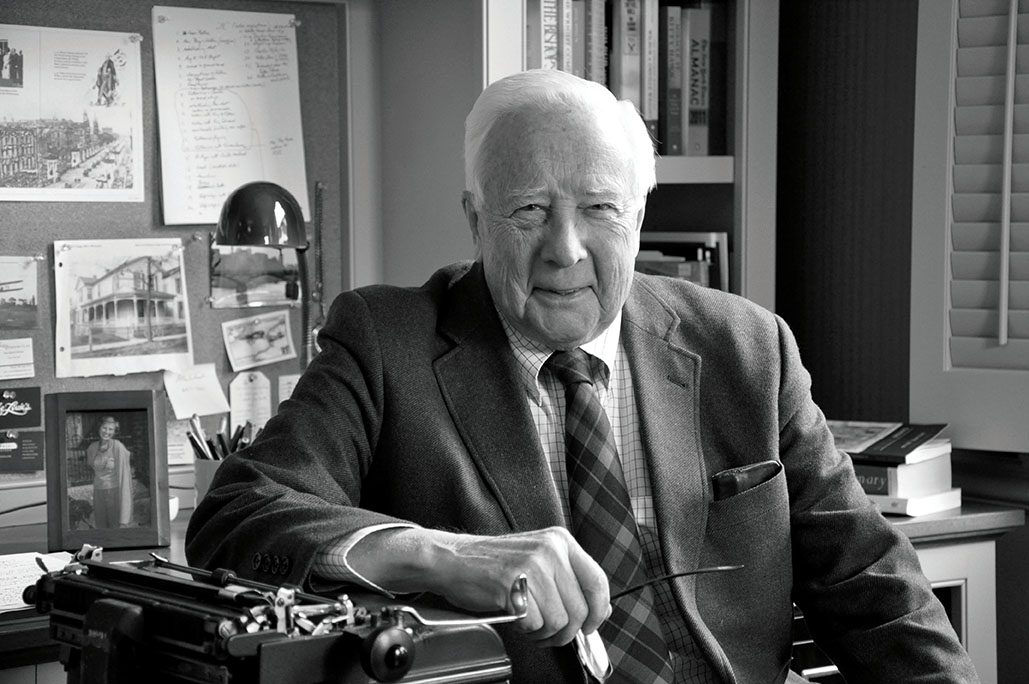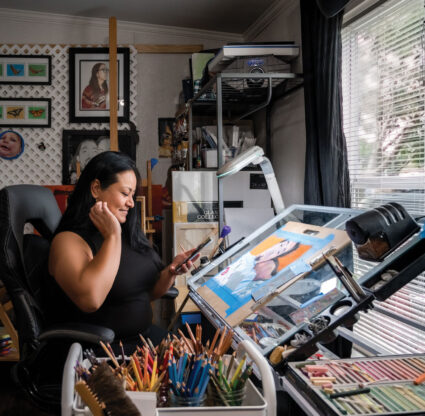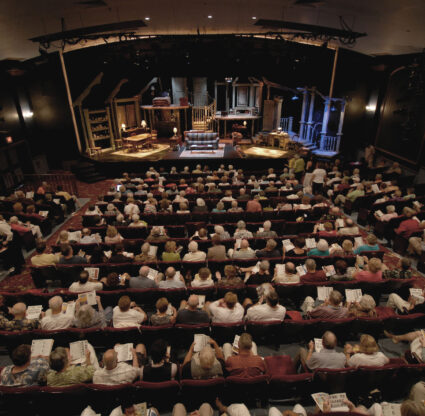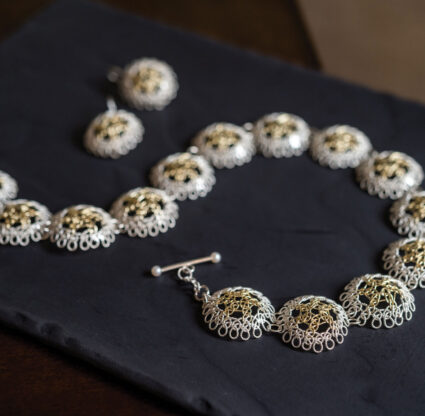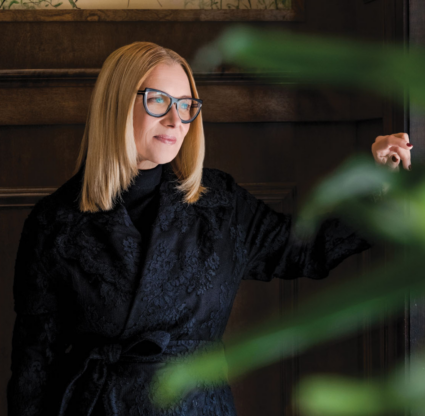“They lived in the same house, worked together six days a week, ate their meals together, kept their money in a joint bank account, even “thought together,” Wilbur said. Their eyes were the same gray-blue, though Orville’s were less predominant and closer together. Their handwriting was quite alike—consistently straight and legible—and their voices so alike that someone hearing them from another room had trouble knowing which was doing the talking.”
Three sentences. That’s all it takes in one of historian David McCullough’s books to make historical figures—in this case Wilbur and Orville Wright—transform from dull textbook entries into flesh-and-blood characters. Now add a few hundred more pages and you’ll get a full-fledged understanding of the people, events and circumstances that shaped who we are today.
 The two-time Pulitzer Prize-winning author and former host of PBS’s The American Experience hit a milestone last December—the 50th anniversary of the signing of his first contract with Simon & Schuster—and last May celebrated the publication of his 10th book, The Wright Brothers. In those decades, McCullough has tackled topics ranging from the catastrophic 1889 flood in Johnstown, Pennsylvania, to the presidencies of Truman and John Adams to the building of the Brooklyn Bridge and the influence Paris had on the American intellectuals who flocked there in the 1800s.
The two-time Pulitzer Prize-winning author and former host of PBS’s The American Experience hit a milestone last December—the 50th anniversary of the signing of his first contract with Simon & Schuster—and last May celebrated the publication of his 10th book, The Wright Brothers. In those decades, McCullough has tackled topics ranging from the catastrophic 1889 flood in Johnstown, Pennsylvania, to the presidencies of Truman and John Adams to the building of the Brooklyn Bridge and the influence Paris had on the American intellectuals who flocked there in the 1800s.
“Sometimes I think I don’t go after the idea, but the idea comes after me,” McCullough told Gulfshore Life from his Boston apartment last November. By now, the historian should be thawing out in Southwest Florida; he spends two months out of the year in a rented home in Naples, a city he’s grown to love—though he said he’s not sure it’ll inspire any future works. “I’m in the period where I’m just mulling possible ideas, and I want to take a greatly needed break,” he said, tactfully. “It’s been an extremely busy year with the publication of The Wright Brothers.”
Indeed. The book hit No. 1 on The New York Times best-selling list and has been the subject of countless interviews and reviews. McCullough unearthed details previously unexplored—the Yale-bound Wilbur’s abrupt change of fate after losing his front teeth in a hockey game and the role sister Katharine played in her brothers’ history-altering accomplishments. He loves finding those obscure details. He delights in discovering the secondary characters whose influence is undeniable—and yet unrecognized.
“Writing a book, for me, is a journey. It’s an adventure. It’s working on a detective case. It’s the learning process—the love of learning about the subject—that propels me, that makes me want to get up out of bed in the morning,” he said.
We wanted to know more about how McCullough captures that information and spins it into story. The writers among us will no doubt appreciate the insights the master offers about the craft. But so, too, will anyone who has ever picked up one of McCullough’s tomes and wondered: How on earth did he learn that?
On his beginning
When Kennedy became president, I went to work as an editor and writer for the U.S. Information Agency under Edward R. Murrow. It was during that time … that I just happened upon some old photographs that were taken at Johnstown, Pennsylvania, after the famous breaking of the South Fork Dam. I had grown up in Pittsburgh, and I had heard about the Johnstown Flood all my life, but I never imagined such destruction as I saw in those photographs. I wanted to know more, so I took a book out of the library and it really was not very satisfactory, so I took another one out and it was even less of what I wanted. So I thought: Why don’t you try to write the book you’d like to be able to read? Once I got started working on this project, I realized this is what I wanted to do from then on.
On capturing the details
You have to go to the places where events took place. You have to see what it looks like. You have to smell the smell of the coal smoke through the air or see how the light falls on the mountainside or walk the walk that your characters have walked. And do it in season. If [the event] happened in the winter, go in the winter.
On getting to know his characters
I have relied heavily on photographs. Photographs as a research element are infinitely more valuable than a lot of writers, historians and biographers seem to understand. … I interview all kinds of people. Even on subjects where there are no longer living veterans of the time, I interview people who know a lot about it or know about the town or terrain or the families that were involved. Additionally, I believe strongly in reading not only what (my subjects) wrote, but what they read. We are, to a very large degree, what we read.
On his process
At first I thought you do all the research and then you write the book, but I pretty quickly realized: No, you needed to do enough of the research to get started with the writing, but you need to get going on the writing as soon as possible because that’s how you realize how much you don’t know and how much more you need to know.
I love doing the research. People often ask me, “How much of your time do you spend researching and how much time do you spend writing?” But nobody ever asks me how much of my time I spend thinking. The thinking is often the most important part of it.
On his favorite writing tool
I work on a typewriter, a manual typewriter, the same typewriter I bought to get started on my first book, The Johnstown Flood, 50 years ago. It was second-hand, 25 years old then. It’s 75 years old now, and I’ve written every book, every essay, every speech I’ve ever given all on this one typewriter.
People say, “Don’t you know how much faster you could go if you used a word processor?” Of course I know how much faster I could go. I don’t want to go faster. If anything, I should probably go more slowly. I don’t think all that fast.
On choosing his topics and themes
(In the beginning) I have no idea what my theme is. That’s one of the reasons I’m writing the book—it’s to find out what my theme is. Looking back now, I do realize there are certain themes that run through my work. I’m trying in almost every case to give credit where credit is long overdue to people who have not been adequately recognized for how brave they were, how persevering they were, how talented they were or how much they accomplished. I am always looking for a good story, and very often the story is all tied up in the struggle—the struggle to achieve something admirable.
I’m always interested in what you might call the secondary characters. (And) I try as best as I can to bring worthy, female characters to the forefront. Don’t let them hang backstage—bring them front and center stage. It was true of Emily Roebling, the wife of the builder of the Brooklyn Bridge, certainly of Abigail Adams, and now Katharine Wright in the story of the Wright brothers. I know how important my wife is in my life, and I would never want her to be kept in the shadows by people who didn’t understand our lives together. I want to be fair.
On the teaching of history
We are doing a very poor job of educating our children and grandchildren on the history of our country. It’s a problem, and one that I face and have been doing my best to help correct again and again when I lecture. What these young people don’t know sometimes is surprising—you have to laugh or you’d cry.
I think it has to do with the terribly dull textbooks. I think you should only teach using good writers—first-rate writers. I also think history should be required. Knowing the story of your own country—knowing (about) these people to whom we owe so much and … what they went through in order to create the country and the advantages and the ideals we enjoy [is critical]. This didn’t just happen. If you are ignorant of the story of your own country, it isn’t just a sign of ignorance. It’s a sign of gross ingratitude.
On making history vibrant and relevant
History is about people. It’s human. “When in the course of human events,” Jefferson wrote. If you don’t understand the people, if you don’t understand what made them tick or why they ticked the way they ticked, then you can’t really understand what happened. It’s where, when, why, who.
Dickens said, “Make me see.” You have to bring the reader into the scene, into the moment, into the place and make them not only see it and smell it and hear it, but know who these characters are. And you’ve got to get below the surface. That’s not easy to do, but it can be done through what they wrote privately. I’ve worked with subjects who wrote in enormous quantities of letters that were very revealing and very personal and very private. That was true with Truman. That was true with John and Abigail Adams. It’s been true in a very powerful way with the Wright brothers, too.
On his outlook for future historians
Future historians will have a devil of a time writing about us. Communication is electronic, and there’s a big question of how long that will last. Nobody in public life would dare keep a diary any more because it can be subpoenaed and used against you in court. We don’t write letters. We don’t encourage our children or grandchildren to write letters. Many of our young people today can’t even write, and this is a serious thing because the act of writing focuses the brain to think in a way that nothing else does. If we’re not writing, we’re not thinking. So much of all of this is about thinking—it’s about ideas. History is a storehouse of ideas, and so far no computer has ever had an idea. People have ideas.
On his time in Naples
We’ve come to be very fond of the whole life in Naples, and there is certainly much to do and marvelous restaurants, and I think the beach is as beautiful a beach as I have seen anywhere. I love to walk, and I’ve gotten mixed up with a Dixieland jazz band that plays in the park every Sunday. I do a little singing, but mostly I just like to go and be in on their rehearsals. I adore Dixieland jazz. They are superb.
The Bob Graham Center for Public Service at the University of Florida will host an Author’s Evening with David McCullough on Tuesday, March 22, at 6 p.m. at The Naples Beach Hotel & Golf Club. Tickets are $100 for the event alone or $250 to include a private reception with McCullough and former U.S. Sen. Graham at 5 p.m. Contact Sherry Feagle at sfeagle@ufl.edu or (352) 846-1575 for tickets or more information. Proceeds benefit the Bob Graham Center.

